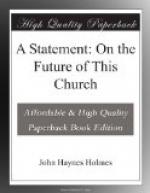When the significance of this transformation first broke upon me, I felt an impulse to leave the church, and attach myself directly to the labor movement. I recall how my soul leapt in answer to the great scene at the close of Kennedy’s “The Servant in the House,” when the Vicar strips off his clerical garb, seizes the dirty hand of his brother, the Drain-Man, and cries out, [9] “This is no priest’s work—it calls for a man!” I was deterred, however, not, I hope, by cowardice but by wisdom. On the surface I felt that I should miss the services of the church—the prayers and worship with my people. Deeper down, and nearer the heart of things, was an unshaken trust in the church as a social institution. I loved her traditions, reverenced her saints and prophets, believed in her destiny—was unconvinced that she must necessarily serve the interests of reaction. At-bottom, was a perfectly clear understanding that my approach to the social question was a spiritual approach, and my acceptance of it the acceptance of a religious task. I saw my new position as nothing more nor less than the logic of Christianity. Men must be free from all oppression, because they are children of God, and therefore living souls. They must be equal in opportunity and privilege, because they are members of the holy family of God, and therefore brothers. They must be lifted up out of poverty, disease, war, because their heritage is the life of God, and they must have it abundantly. The material aspects of the social question, I would be among the last, I trust, to ignore. These are central—but central only as the fetters are central to the problem of slavery. Furthermore, the means which I recognized to the great end, were also spiritual. I could find no place in my thought for the use of violence. The plea of class-conscious rebellion never won my acceptance. Only patience, persuasion, and much love for humankind, seemed to me legitimate weapons of reform. In other words, I was again a victim of the logic of Christianity. And where did this logic hold me, if not to the church? Where could I make plain my spiritual position, or bring to bear my spiritual influence, apart from the church? If this institution must hold me altogether aloof from the social question, then of course my duty was manifest. But its pulpit was wide open to social preaching; its altar a chosen place for social consecration; and its machinery of service all at hand to be shifted from the gear of [10] charity to the gear of justice. Why not stay, therefore, in the church, as Theodore Parker stayed, and fight capitalism, as he fought slavery, in the garb of a minister of Christ?




